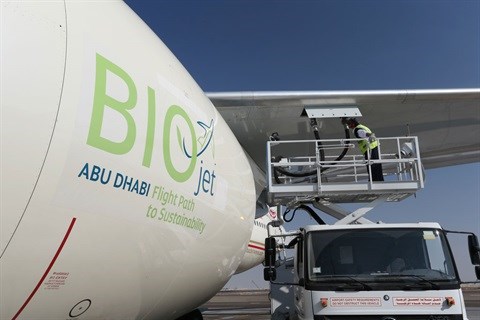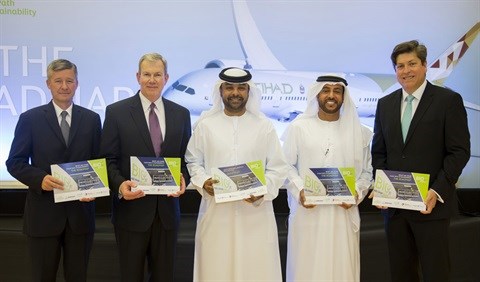Roadmap for UAE biofuel industry presented
The BIOjet Abu Dhabi: Flight Path to Sustainability report outlines a set of recommended industry actions to create a commercially viable domestic aviation biofuel industry in the Middle East.

The BIOjet Abu Dhabi roadmap is the culmination of an extensive year-long dialogue between Etihad Airways, its four BIOjet Abu Dhabi partners, and UAE and global stakeholders. It explains Abu Dhabi's potential to produce aviation biofuel locally, in a sustainable way, taking account of all elements of the supply chain from feedstock supplies to biorefining and distribution.
Significant opportunity
James Hogan, president and CEO of Etihad Airways, said: "The industry's licence to grow can only be granted if we find and implement ways to lower the carbon footprint of commercial aviation.
"Together with our partners, we are proud to present our roadmap to encourage greater commitment from the industry and local community in establishing a sustainable biofuel supply chain in the UAE - the next logical step in Abu Dhabi's renewable energy commitments. The formation of a viable UAE aviation biofuel industry in Abu Dhabi presents significant opportunity for the capital's ongoing economic diversification initiatives."
The roadmap explores how a supply chain can be established in the UAE through the exploration of sustainable feedstocks, new infrastructure requirements and necessary policy frameworks. It indicates that Abu Dhabi holds significant potential to supply domestic feedstocks for use in aviation biofuel.
Local research
The roadmap builds on local research undertaken by the Sustainable Bioenergy Research Consortium, led by the Masdar Institute, whose flagship project is the Integrated Seawater Energy and Agriculture System (ISEAS). ISEAS is an initiative to develop a unique form of agriculture, producing food and energy products on traditionally non-arable desert land irrigated with seawater. The pilot ISEAS facility is currently under construction within Masdar City.

Dr. Fred Moavenzadeh, president, Masdar Institute, said: "In order to commercialise these technologies, efforts such as BIOjet Abu Dhabi are essential. Through the knowledge that our researchers have contributed, we are pleased to be supporting the establishment of this industry and progressing the UAE's economic diversification and innovation priorities."
The concluding action plan identifies opportunities, challenges and concerns in the commercial scale-up of domestic biofuel production, and will require the commitment of all stakeholders in addressing these.






